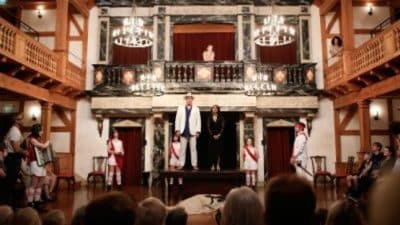– State News: Kaine announces agreement on passenger rail in Lynchburg, Wednesday, 4:15 p.m.
– Capitol Hill: Report explores defense-contractor case decline, Wednesday, 4:15 p.m.
– Capitol Hill: Perriello proposes earmark reform, Wednesday, 4:15 p.m.
– State News: Kaine signs law barring REAL ID compliance, Wednesday, 10 a.m.
– Capitol Hill: GSA outlines proposed public-building spending, Wednesday, 10 a.m.
– Local News: Webb, Warner announce funding for community health centers, Wednesday, 10 a.m.
– Economy: FAA forecast foresees growth in air travel, Wednesday, 10 a.m.
– Local News: JMU PR program wins plaudits, Wednesday, 10 a.m.
– Event: EMU Wind Ensemble to perform, Wednesday, 10 a.m.
State News: Kaine announces agreement on passenger rail in Lynchburg, Wednesday, 4:15 p.m.
Gov. Timothy M. Kaine is joining Norfolk Southern Railway CEO Wick Moorman today to sign a Memorandum of Understanding between Virginia and Norfolk Southern Railway for the construction of infrastructure improvements to support new freight and passenger service to the Lynchburg region. The signing ceremony at Kemper Street Train Station today is a key milestone in an innovative public-private partnership among Amtrak, Norfolk Southern Railway, and the Commonwealth of Virginia, that will double passenger rail train service for residents of Central Virginia this fall. Similar agreements will be executed with Amtrak next month, launching a project that will connect every community along the route to Washington, D.C., and the entire Northeast Corridor.
“With two new regional passenger rail services launching this year, the Commonwealth is making real progress toward providing more transportation choices for all Virginians while helping grow our economy,” Gov. Kaine said. “This agreement will be a great economic boost for the region and would not have been possible without the hard work of Amtrak, private partners, local officials, and legislators, especially Del. Shannon Valentine, who has worked tirelessly behind the scenes to make this agreement a reality.”
At its Feb. 18 meeting, the Commonwealth Transportation Board provided operational funding to support a three-year pilot program in two rail corridors: between Lynchburg and Washington, D.C., and between Richmond and Washington, D.C. Both trains will continue to additional destinations in the Northeast Corridor. Today’s announcement, coupled with last month’s approval of federal funding for the Dulles Corridor Metrorail project, represents a shift toward increased state investment in rail and mass transit.
“This new rail service will connect communities along US29 and I-95 to Washington, D.C., and the entire Northeast Corridor,” said Del. Valentine. “Wise investments in transportation infrastructure, including freight and passenger rail, are vital for for economic development and long term growth.”
“This project demonstrates the value of public-private partnerships for rail transportation,” said Wick Moorman, CEO of Norfolk Southern Railway. “Improving Virginia’s rail infrastructure benefits both businesses and citizens through more competitive freight rail shipping and enhanced passenger rail service statewide.”
The governor’s announcement was part of a ceremony today marking the beginning of construction for rail infrastructure improvements that will support new passenger rail service in the Lynchburg region. Construction of platform, track, and rolling stock improvements will begin in April 2009, and service is expected to begin in October 2009.
Capitol Hill: Report explores defense-contractor case decline, Wednesday, 4:15 p.m.
The number of defense contracting fraud and corruption cases sent by government investigators to prosecutors dropped precipitously under the Bush administration, even as contracting by the Defense Department almost doubled, according to “Fraud Cases Fell While Pentagon Contracts Surged,” a new investigative story by the Center for Public Integrity.
Defense contracting grew from about $200 billion in fiscal year 1993 at the start of the Clinton presidency to nearly $400 billion in fiscal year 2008 at the end of President George W. Bush’s administration (1993 dollars adjusted for inflation to 2008 dollars). But Defense Department investigators during the Bush administration sent 76 percent fewer contracting fraud and corruption cases to the Justice Department for potential criminal prosecution than under Clinton, according to Justice Department data analyzed by the Center. Referral statistics from the Federal Bureau of Investigation reflected a similar trend.
The drop in prosecutions appears to be the result of regulatory and legislative changes, shifting priorities and declining manpower and expertise. The result, says William G. Dupree, a former top official of the Defense Criminal Investigative Service, is that “no one is minding the store.”
Organizational support for the Center is provided by the Carnegie Corporation of New York, the Ford Foundation, the John S. and James L. Knight Foundation, the John D. and Catherine T. MacArthur Foundation, the Park Foundation, the Popplestone Foundation, the Rockefeller Brothers Fund, and many other generous institutional and individual donors.
Capitol Hill: Perriello proposes earmark reform, Wednesday, 4:15 p.m.
Delivering on his commitment to fiscal discipline, Congressman Tom Perriello today unveiled an earmark process that insists on public transparency, emphasizes investments that create real value, and reflects Fifth District priorities. He also outlined a five-step process that can increase public understanding of the appropriations process.
“This is a serious step towards transparency for taxpayers. As promised, we have set up a public process for submitting proposals and identified cost-effective and transformative projects; then we will post our requests online,” said Perriello. “I am eager to find investments that create real value and economic development in our communities, but I’ve got to be willing to put my signature on any request we submit.”
All projects were selected for meeting at least one of the key criteria set by Perriello:
– Transformative: has the potential to be a game-changer for the economy of a community, particularly for projects that will put the 5th District at the forefront of the new energy economy.
– Cost-Effective (“bang for the buck”): uses limited funds efficiently to produce greater impact on quality of life or economic development in the community.
– Job Creators: creates or attract jobs; will bolster the Fifth District’s competitive advantage in the global economy.
The Five-Step Appropriations Process:
Step 1: Congressman Perriello proactively invited applications from localities, nonprofits, and businesses that wished to request appropriations in order to ensure that strong ideas emerged from the ground up. His Legislative Director Beth Elliott held workshops around the 5th District to instruct applicants on appropriations procedures.
Step 2: Based on written applications, face-to-face meetings, and project tours, Perriello prioritized the projects based on the key criteria outlined above.
Step 3: Congressman Perriello will post earmark requests on his website on April 3, 2009, the day the requests are made at the federal level. The website listing will include an explanation of what the project would do for the Fifth and the reasons for investing these federal funds in the district.
Step 4: Also at the time the request is made, the congressman will send the committee a letter certifying that he will not benefit financially from any earmarks.
Step 5: When the appropriations bill comes up for a vote, it will be accompanied by a list identifying each earmark in it and which member requested it. These tables will be made publicly available ahead of the vote.
State News: Kaine signs law barring REAL ID compliance, Wednesday, 10 a.m.
Virginia Gov. Tim Kaine has signed legislation prohibiting the state from complying with provisions of the federal REAL ID Act that compromise the privacy rights of the state’s citizens.
The anti-REAL ID bills were introduced this year by Republican legislators – Del. Robert G. Marshall (HB 1587) and Sen. Ken T. Cuccinelli (SB 1431) – but received overwhelming bipartisan support in the both the House and Senate.
“This is the strongest statement in favor of privacy rights to come out of the Virginia General Assembly in many years,” said Kent Willis, ACLU of Virginia executive director and a member of former Gov. Mark Warner’s REAL ID Task Force. “REAL ID is a costly, clumsy tool that will likely do little more than create even longer lines at DMVs and expand employment opportunities for identity thieves.”
Passed by Congress in 2005, but still unimplemented, the REAL ID Act requires every state to issue a federally-approved driver’s license or similar ID that will become part of a national database. Real IDs will be required to board an airplane and to access many federal facilities.
Since its enactment, REAL ID has faced significant pushback in the states. To date, 22 states have passed legislation denouncing the federal initiative. During her January confirmation hearing, Department of Homeland Security Secretary Janet Napolitano called for a review of REAL ID, saying the states were not consulted enough in its creation and that the initiative is a fiscal burden on the states. Before heading up DHS, Napolitano was governor of Arizona, where she enacted legislation prohibiting her state from complying with the requirements of REAL ID.
Because REAL IDs require significantly more background information than a driver’s license, privacy experts fear that the government will now have access to an unprecedented amount of highly sensitive information on citizens and that there will be an exponential rise in identity thefts from the database where the information is stored.
The Virginia law is not an outright rejection of REAL ID, but it will prohibit any ID, or database linked to the ID, from containing biometric data (e.g., DNA, fingerprints, or retinal scans) or financial information (e.g., tax returns or personal investment information) that compromise “economic privacy.”
For more information on REAL ID visit www.realnightmare.org.
Capitol Hill: GSA outlines proposed public-building spending, Wednesday, 10 a.m.
The U.S. General Services Administration has submitted a $5.55 billion spending proposal to Congress highlighting the public building projects it plans to accomplish with funds from the American Recovery and Reinvestment Act. The Recovery Act directs $750 million to renovate and construct federal buildings and courthouses, $300 million to renovate and construct land ports of entry and $4.5 billion to convert federal buildings to high-performance green buildings.
The complete list of projects will be made available on-line at: www.recovery.gov.
“GSA welcomes this unprecedented and exciting opportunity to contribute to our nation’s economic recovery, address strategic energy goals and reinvest in our public buildings,” said acting administrator Paul F. Prouty. “We are ready to move forward with speed, tempered by careful consideration of our responsibilities and accountability to the American taxpayer.”
GSA’s Public Buildings Service is responsible for the design, construction, operation and maintenance of thousands of federally owned facilities for more than 1 million civilian employees of the federal government.
Projects were selected based on the speed at which jobs can be created and how much added energy efficiency can be gained. GSA will award $1 billion dollars in the first 120 days. All contracts will be awarded within the next two years.
Local News: Webb, Warner announce funding for community health centers, Wednesday, 10 a.m.
Senators Jim Webb and Mark R. Warner announced Tuesday that the U.S. Department of Health and Human Services (HHS) has released more than $5.2 million to strengthen services offered at twenty-four community health centers in Virginia as part of the American Recovery and Reinvestment Act.
The grants will be used by health centers over the next two years to create or save staff positions at a time when clinics have seen increasing number of patients who lack health insurance during this economic downturn. Health centers deliver preventive and primary care services to patients regardless of their ability to pay. Charges for services are set according to income.
“Located predominately in inner-city and rural communities where health care can be inaccessible or otherwise unaffordable, community health centers serve as a safety net for Virginians who wouldn’t otherwise have the means to see a primary care doctor,” said Sen. Webb. “This funding will help communities provide high-quality health care to those who are uninsured during this difficult economic time.”
“These grants will help expand access to high quality health care service for Virginians who don’t have insurance, while creating and preserving health care provider jobs as well, especially in some of our rural areas,” Sen. Warner said.
Among the grant recipients were:
– Harrisonburg Community Health Center Inc., Harrisonburg $100,000
– Highland Medical Center Inc., Monterey $116,106
Economy: FAA forecast foresees growth in air travel, Wednesday, 10 a.m.
The Federal Aviation Administration (FAA) annual aviation forecast released today predicts a return to growth for air travel in the long term, underscoring the need for vital aviation infrastructure and environmental improvements contained in the FAA’s comprehensive Next Generation Air Transportation System plan.
“A vibrant, efficient and green aviation system will play a key role in our nation’s economic recovery,” said U.S. Secretary of Transportation Ray LaHood. “The Obama Administration is committed to essential safety and efficiency advancements that will meet our continued air travel demands.”
Due to the current worldwide economic downturn, the FAA’s 16-year forecast for 2009-2025 predicts domestic passenger enplanements to decrease by 7.8 percent in 2009 and then grow an average of 2.7 percent per year during the remaining 15-year forecast period. While last year the FAA predicted the U.S. airlines would reach a billion passengers a year by 2016, today’s forecast projects U.S. airlines to reach one billion air travelers annually by 2021. The number of passengers on U.S. airlines domestically and internationally is forecast to increase from 757.4 million in 2008 to 1.1 billion in 2025.
U.S. aircraft operations are predicted to experience a 5.7 percent decrease in 2009 from 2008 levels. Beginning in 2010, the agency expects operations to grow at an average annual rate of 1.5 percent for the remainder of the forecast period.
Local News: JMU PR program wins plaudits, Wednesday, 10 a.m.
The public relations education program at James Madison University has earned national recognition by receiving honorable mention in the 2009 PRWeek Awards.
Finalists were announced at an awards ceremony at Tavern on the Green in New York City on March 5. New York University was named education program of the year and the University of Alabama received the other honorable mention award. Other education program finalists were Georgetown University and University of Southern California.
The awards, considered among the most prestigious in the public relations profession, annually honor the nation’s best corporate, agency, nonprofit and educational achievements. The awards program is sponsored by PRWeek, one of the industry’s major publications, and a number of leading public relations firms. The education program of the year award recognizes achievements in curriculum innovation contributing to the professional preparation of future public relations practitioners.
The JMU School of Communication Studies’ public relations program has undergone significant changes over the past several years, including the addition of faculty members, the introduction of international programs and new courses involving new media.
“The program strives to ensure both a strong liberal arts foundation and cutting-edge professional preparation in essential knowledge, skills, techniques and ethics,” said Frank Kalupa, professor and director of a Middle East-Europe study abroad program.
Students participating in the international best practices tour receive briefings from professionals in London; Doha, Qatar; Dubai and Abu Dhabi, United Arab Emirates; Istanbul; Paris; Berlin; and Brussels.
The public relations program is acknowledged for multiple achievements, including establishment of a chapter of the Public Relations Student Society of America, which is considered the pre-eminent preprofessional organization. The new JMU chapter has more than 100 members.
On March 27 and 28, JMU was host to Digital 101, a conference presented by Edelman, the world’s largest independent public relations firm. Students participating in the conference learned how to use the tools and techniques of new media to effectively formulate a campaign by top Edelman professionals. Edelman was named PRWeek’s 2009 Agency of the Year.
“All of these opportunities prepare our students to fulfill the highest expectations of their future employers as well as society,” said Corey Hickerson, assistant professor of communications studies.
Event: EMU Wind Ensemble to perform, Wednesday, 10 a.m.
The Eastern Mennonite University Wind Ensemble will present its spring concert 7:30 p.m. Tuesday, April 7 in Lehman Auditorium.
The 25-member group, directed by James Warner, will play a varied repertoire of selections for wind instruments.
The program will include: “Variants On a Shaped Note Tune” by Johnnie Vinson, “Canzona,” a brisk short work premiered by the Eastman Wind Ensemble in New York in 1951; “Variations” on “A Mighty Fortress is Our God,” by Tim Waters; “Nettleton,” an early American hymn tune arranged by Johnny Vinson, “Pennywhistle Jig” by Henry Mancini with Michelle Leaman featured on piccolo; and others.
Warner, who is also director of the EMU Jazz ensemble, taught in public schools for 34 years in Pennsylvania, West Virginia and Virginia, most of this time as director of bands at Harrisonburg High School. He retired from HHS in July, 2005.
Admission to the concert is free; donations are welcomed for the EMU music student scholarship fund.










